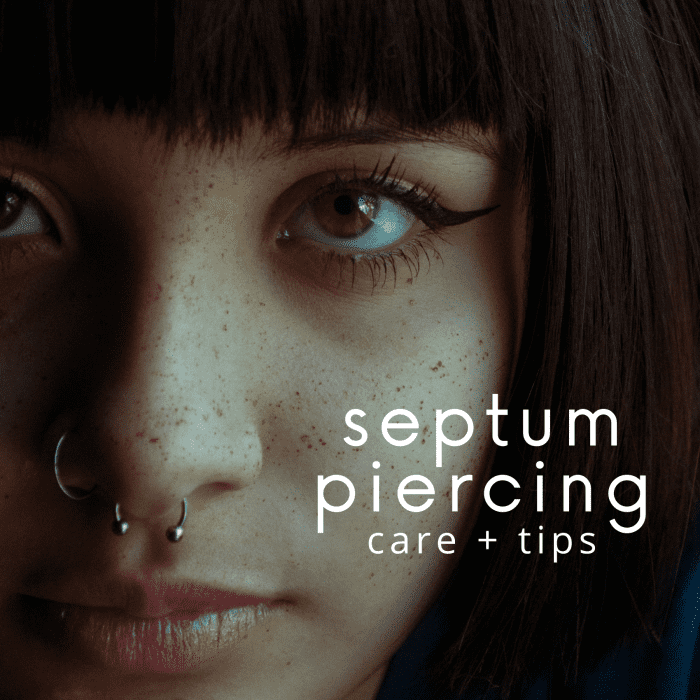How to Take Care of a Septum Piercing
I learned about how to care for septum piercings when I got mine done. There are only a couple must-dos, but plenty of must-NOT-dos!

Septum Piercing Care and Healing Tips
Owen Vangioni via Unsplash; Canva
What Is a Septum Piercing?
A septum piercing is a piercing through the septum—the wall that divides the nostrils. In most cases, the actual cartilage itself is not pierced. Piercers will generally go through what is known as the "sweet spot," the small, softer area between the cartilage and the bottom of the nose. If you put a finger in each nostril, pinch your septum, and drag your nose down, you should be able to locate it.
Howerver, not everybody has a sweet spot, so in some cases, the cartilage will be pierced. This will typically be more painful than a standard septum piercing through the sweet spot.
Where is the septum piercing "sweet spot"?
Where the piercing sits exactly will vary from person to person, depending on where their sweet spot is. On some people, it will be pierced close to the tip of the nose and in others, it will be further back.
Can you hide a septum piercing?
Septum piercings are perhaps the easiest to hide if your workplace is not accepting of body modifications. With the right jewelry (a septum keeper or a circular barbell), the piercing can be hidden by flipping the jewelry up into the nostrils, making it invisible to the eye.
Is a septum piercing a cartilage piercing?
It depends—in most cases no, a septum piercing usually goes through the flesh right next to it (the "sweet spot") but not the cartilage itself. Not everyone has a sweet spot, however, so in some cases, the cartilage will be pierced.
What's the Best Way to Clean Your Septum Piercing?
The best way to clean your new piercing is to use a saline solution. Many piercers may sell a ready-made solution (such as H2Ocean) but it is easy to make your own at home. See recipe below.
Step 1: Make Your Own Saline Solution
Mix 1/4 teaspoon of sea salt into 8 oz (250 ml) of warm distilled water. The water should not be too hot, as this can aggravate the piercing and, obviously, burn you. Leave the mixture to cool until it is about as warm as an easily drinkable cup of coffee.
Read More from Tatring
What kind of salt should I use? Sea salt is the best kind of salt to use for your solution. Some people have found that using table salt as a substitute works, but this is not recommended due to minerals it can contain. Epsom salts should be avoided, as these contain magnesium sulfate and not sodium chloride.
Step 2: Soak Your Nose or Apply a Compress
It can be difficult to completely submerge the piercing into a glass of water, but if you have a glass that allows you to, then soak it for 5–10 minutes. If not, use a disposable paper towel to create a compress but be careful to not apply too much pressure to the piercing.
Paper towel, cotton ball, or washcloth? Do not use cotton balls as these will leave behind fibers, and do not use washcloths as these can harbor bacteria. A paper towel usually works fine.
Step 3: Rinse After Soaking
When you have finished soaking your piercing, rinse it with clean, cold water and a fresh Q-Tip to remove any discharge or "crusties."
How Often Should I Clean It?
For new piercings, it is recommended that you clean them with a saline solution 2–3 times a day. Don't overdo it, as you can end up drying out your piercing and irritating it.

A picture of my piercings.
Lisa Wright
Things to Avoid After Getting a Septum Piercing
- DO NOT handle your piercing with dirty hands. Make sure to thoroughly clean your hands before touching the piercing in any way, especially before cleaning.
- DO NOT over-clean your piercing with salt solutions. This can dry out and irritate the piercing and delay or complicate healing.
- DO NOT play or fiddle with your jewelry. This will slow down the healing process and can lead to infection.
- DO NOT use strong, perfumed soaps or products containing alcohol or peroxide on or near your piercing. These can cause reactions and aggravate your skin.
- DO NOT keep flipping your piercing up and down. This will irritate the piercing and slow down the healing process. Choose whether you want it up and down, and leave it that way while it heals. Some people find it easier to wear it flipped up while healing to avoid any knocks.
This content is accurate and true to the best of the author's knowledge and is not meant to substitute for formal and individualized advice from a qualified professional.
© 2012 Leese Wright
How to Take Care of a Septum Piercing
Source: https://tatring.com/getting-pierced/septum-piercing-aftercare
0 Response to "How to Take Care of a Septum Piercing"
Post a Comment